Report on Human Resource Management in Hospitality Industry - HND
VerifiedAdded on 2020/10/22
|11
|2280
|366
Report
AI Summary
This report provides a comprehensive analysis of Human Resource Management (HRM) within the hospitality industry, focusing on the roles and responsibilities of HRM in achieving organizational goals. It examines the significance of job descriptions and person specifications, offering examples relevant to the hospitality sector. The report further explores various selection processes, such as interviews and psychometric testing, comparing their effectiveness in different service industry businesses. Additionally, it assesses the contribution of training and development activities to employee performance and customer satisfaction, highlighting their importance in maintaining a skilled workforce. The report concludes by emphasizing the critical role of HRM in ensuring legal compliance and fostering a positive work environment within the hospitality industry.
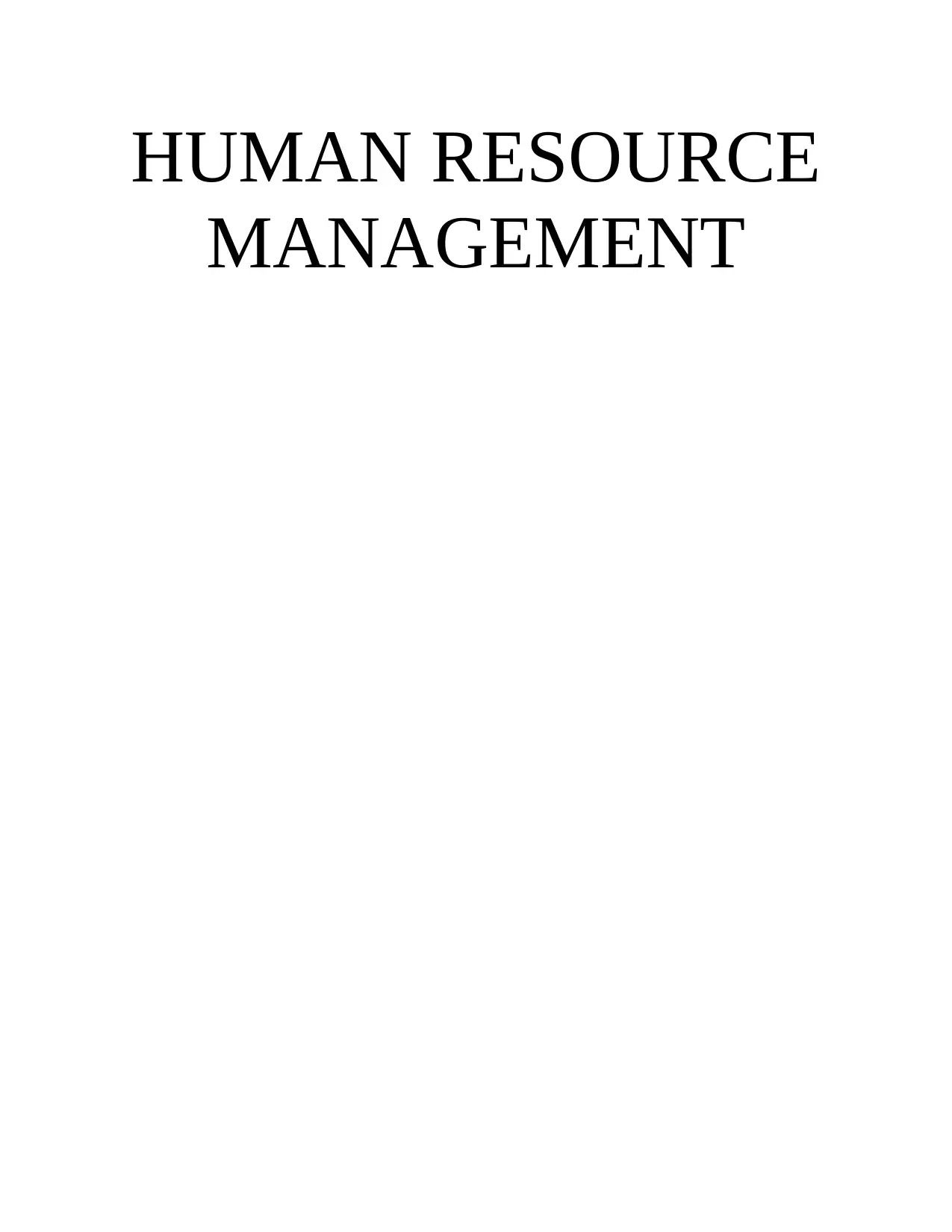
HUMAN RESOURCE
MANAGEMENT
MANAGEMENT
Paraphrase This Document
Need a fresh take? Get an instant paraphrase of this document with our AI Paraphraser
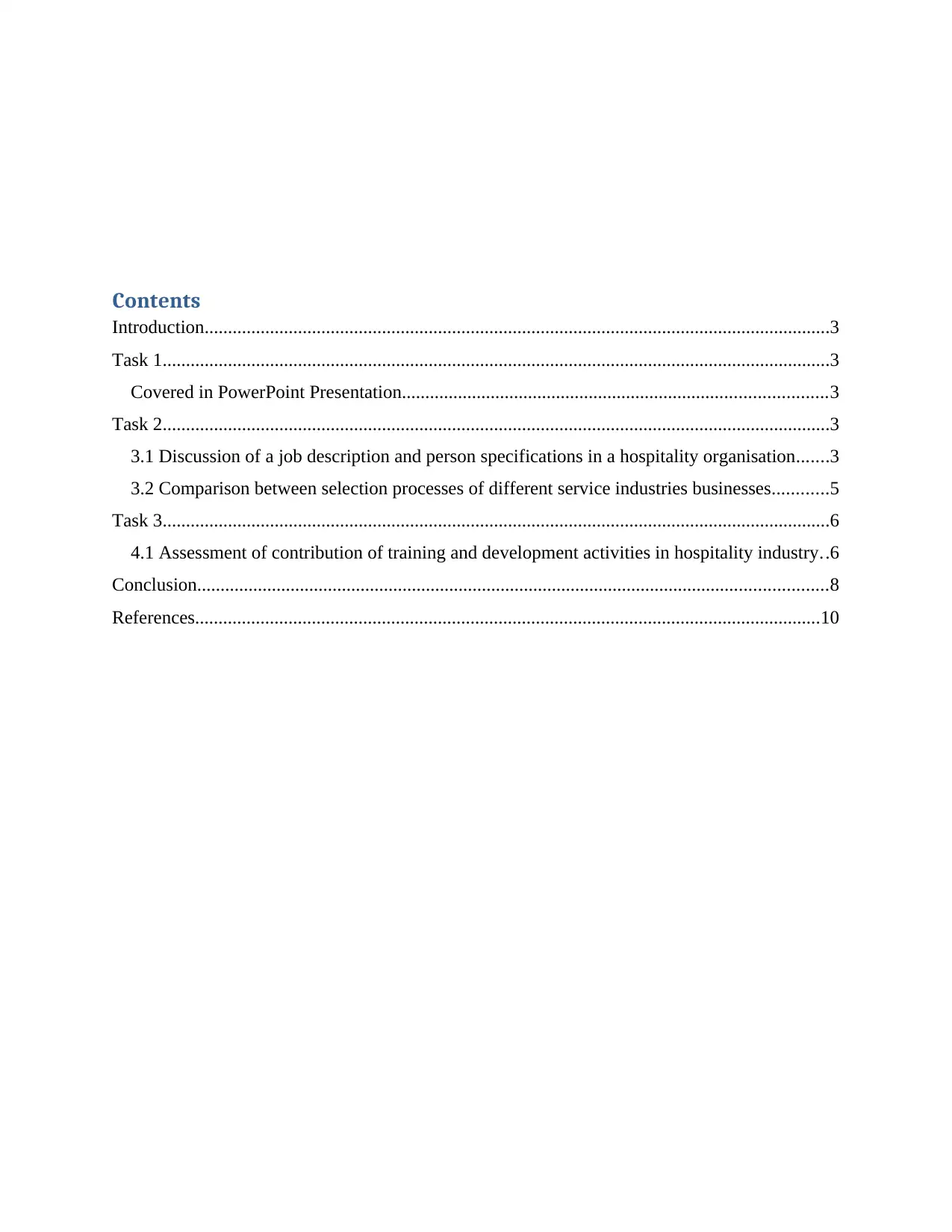
Contents
Introduction......................................................................................................................................3
Task 1...............................................................................................................................................3
Covered in PowerPoint Presentation...........................................................................................3
Task 2...............................................................................................................................................3
3.1 Discussion of a job description and person specifications in a hospitality organisation.......3
3.2 Comparison between selection processes of different service industries businesses............5
Task 3...............................................................................................................................................6
4.1 Assessment of contribution of training and development activities in hospitality industry..6
Conclusion.......................................................................................................................................8
References......................................................................................................................................10
Introduction......................................................................................................................................3
Task 1...............................................................................................................................................3
Covered in PowerPoint Presentation...........................................................................................3
Task 2...............................................................................................................................................3
3.1 Discussion of a job description and person specifications in a hospitality organisation.......3
3.2 Comparison between selection processes of different service industries businesses............5
Task 3...............................................................................................................................................6
4.1 Assessment of contribution of training and development activities in hospitality industry..6
Conclusion.......................................................................................................................................8
References......................................................................................................................................10
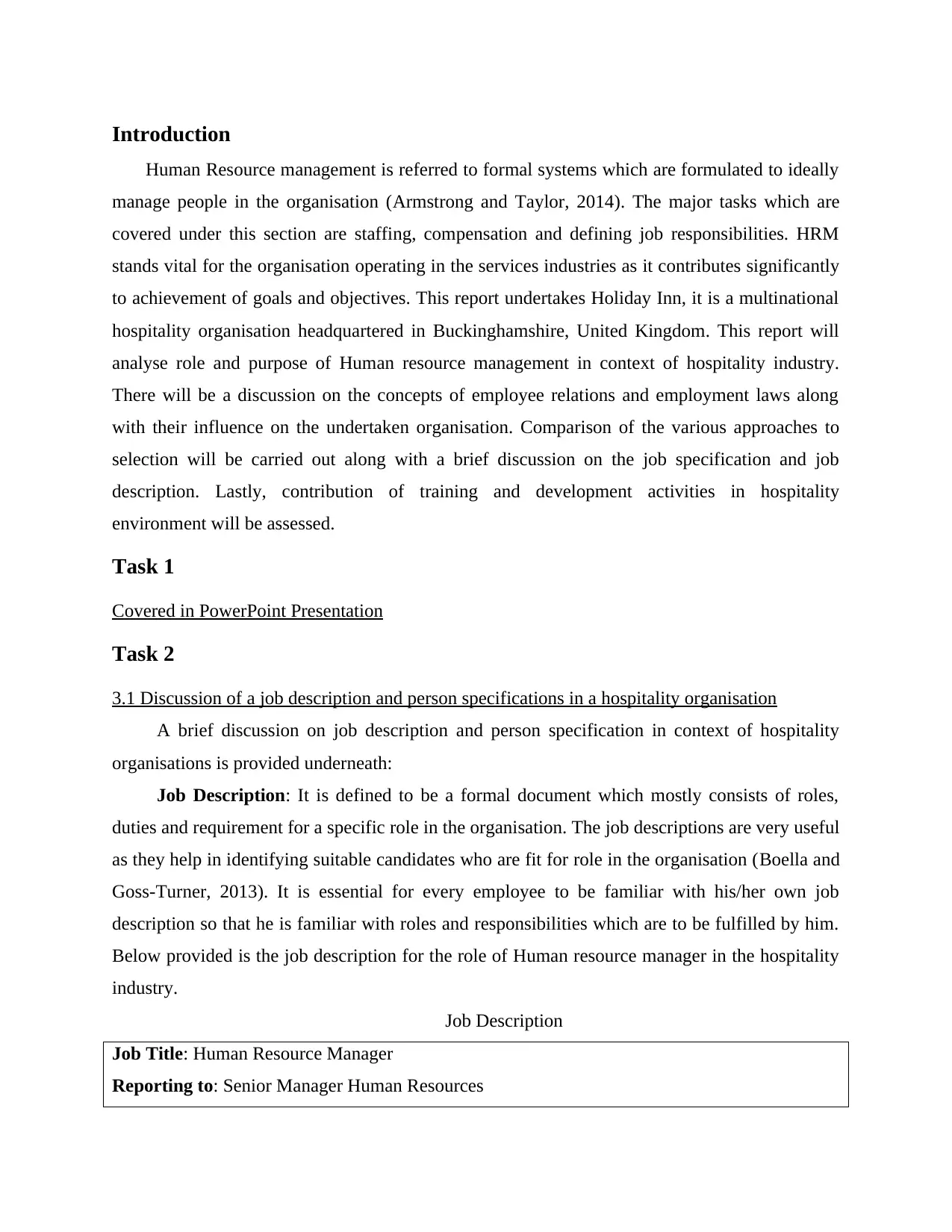
Introduction
Human Resource management is referred to formal systems which are formulated to ideally
manage people in the organisation (Armstrong and Taylor, 2014). The major tasks which are
covered under this section are staffing, compensation and defining job responsibilities. HRM
stands vital for the organisation operating in the services industries as it contributes significantly
to achievement of goals and objectives. This report undertakes Holiday Inn, it is a multinational
hospitality organisation headquartered in Buckinghamshire, United Kingdom. This report will
analyse role and purpose of Human resource management in context of hospitality industry.
There will be a discussion on the concepts of employee relations and employment laws along
with their influence on the undertaken organisation. Comparison of the various approaches to
selection will be carried out along with a brief discussion on the job specification and job
description. Lastly, contribution of training and development activities in hospitality
environment will be assessed.
Task 1
Covered in PowerPoint Presentation
Task 2
3.1 Discussion of a job description and person specifications in a hospitality organisation
A brief discussion on job description and person specification in context of hospitality
organisations is provided underneath:
Job Description: It is defined to be a formal document which mostly consists of roles,
duties and requirement for a specific role in the organisation. The job descriptions are very useful
as they help in identifying suitable candidates who are fit for role in the organisation (Boella and
Goss-Turner, 2013). It is essential for every employee to be familiar with his/her own job
description so that he is familiar with roles and responsibilities which are to be fulfilled by him.
Below provided is the job description for the role of Human resource manager in the hospitality
industry.
Job Description
Job Title: Human Resource Manager
Reporting to: Senior Manager Human Resources
Human Resource management is referred to formal systems which are formulated to ideally
manage people in the organisation (Armstrong and Taylor, 2014). The major tasks which are
covered under this section are staffing, compensation and defining job responsibilities. HRM
stands vital for the organisation operating in the services industries as it contributes significantly
to achievement of goals and objectives. This report undertakes Holiday Inn, it is a multinational
hospitality organisation headquartered in Buckinghamshire, United Kingdom. This report will
analyse role and purpose of Human resource management in context of hospitality industry.
There will be a discussion on the concepts of employee relations and employment laws along
with their influence on the undertaken organisation. Comparison of the various approaches to
selection will be carried out along with a brief discussion on the job specification and job
description. Lastly, contribution of training and development activities in hospitality
environment will be assessed.
Task 1
Covered in PowerPoint Presentation
Task 2
3.1 Discussion of a job description and person specifications in a hospitality organisation
A brief discussion on job description and person specification in context of hospitality
organisations is provided underneath:
Job Description: It is defined to be a formal document which mostly consists of roles,
duties and requirement for a specific role in the organisation. The job descriptions are very useful
as they help in identifying suitable candidates who are fit for role in the organisation (Boella and
Goss-Turner, 2013). It is essential for every employee to be familiar with his/her own job
description so that he is familiar with roles and responsibilities which are to be fulfilled by him.
Below provided is the job description for the role of Human resource manager in the hospitality
industry.
Job Description
Job Title: Human Resource Manager
Reporting to: Senior Manager Human Resources
⊘ This is a preview!⊘
Do you want full access?
Subscribe today to unlock all pages.

Trusted by 1+ million students worldwide
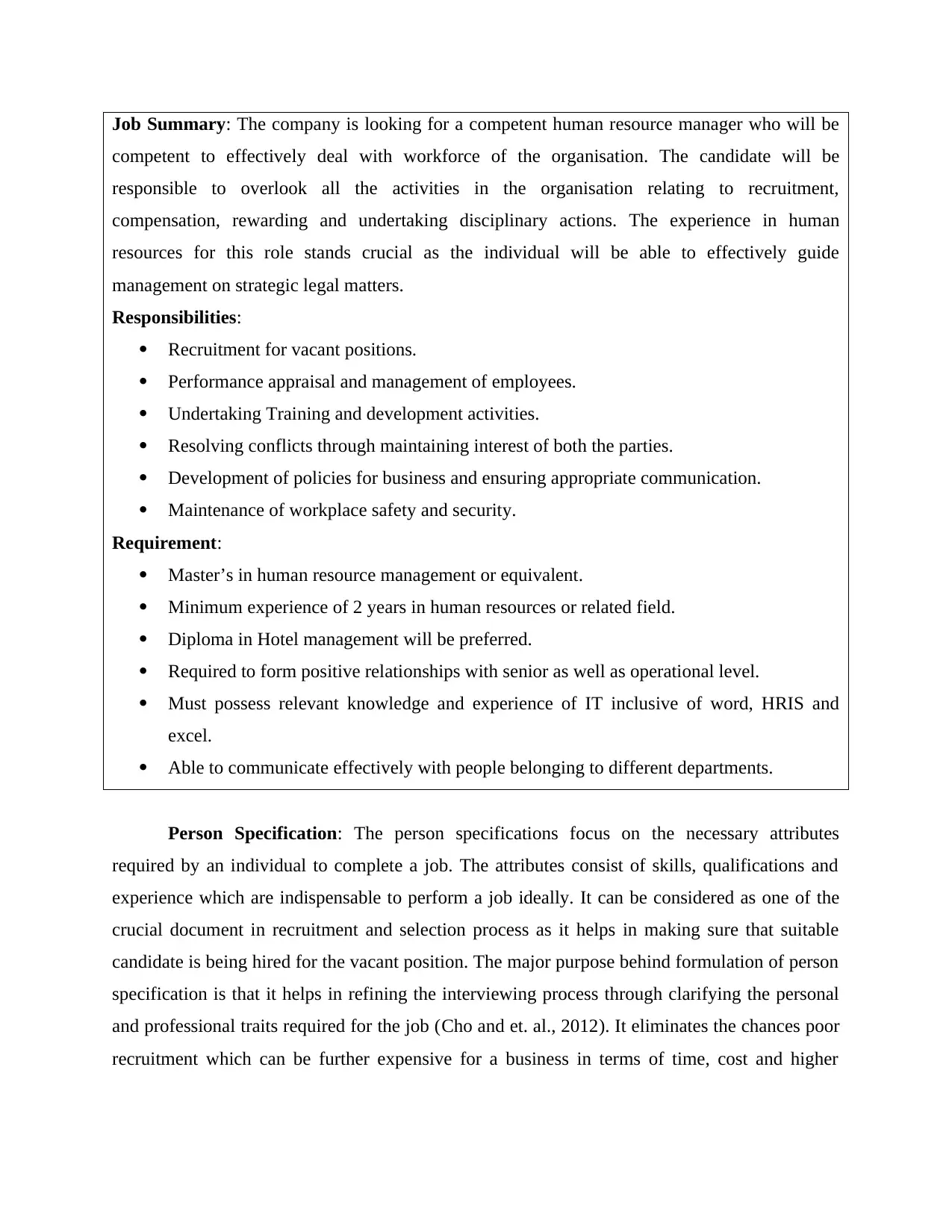
Job Summary: The company is looking for a competent human resource manager who will be
competent to effectively deal with workforce of the organisation. The candidate will be
responsible to overlook all the activities in the organisation relating to recruitment,
compensation, rewarding and undertaking disciplinary actions. The experience in human
resources for this role stands crucial as the individual will be able to effectively guide
management on strategic legal matters.
Responsibilities:
Recruitment for vacant positions.
Performance appraisal and management of employees.
Undertaking Training and development activities.
Resolving conflicts through maintaining interest of both the parties.
Development of policies for business and ensuring appropriate communication.
Maintenance of workplace safety and security.
Requirement:
Master’s in human resource management or equivalent.
Minimum experience of 2 years in human resources or related field.
Diploma in Hotel management will be preferred.
Required to form positive relationships with senior as well as operational level.
Must possess relevant knowledge and experience of IT inclusive of word, HRIS and
excel.
Able to communicate effectively with people belonging to different departments.
Person Specification: The person specifications focus on the necessary attributes
required by an individual to complete a job. The attributes consist of skills, qualifications and
experience which are indispensable to perform a job ideally. It can be considered as one of the
crucial document in recruitment and selection process as it helps in making sure that suitable
candidate is being hired for the vacant position. The major purpose behind formulation of person
specification is that it helps in refining the interviewing process through clarifying the personal
and professional traits required for the job (Cho and et. al., 2012). It eliminates the chances poor
recruitment which can be further expensive for a business in terms of time, cost and higher
competent to effectively deal with workforce of the organisation. The candidate will be
responsible to overlook all the activities in the organisation relating to recruitment,
compensation, rewarding and undertaking disciplinary actions. The experience in human
resources for this role stands crucial as the individual will be able to effectively guide
management on strategic legal matters.
Responsibilities:
Recruitment for vacant positions.
Performance appraisal and management of employees.
Undertaking Training and development activities.
Resolving conflicts through maintaining interest of both the parties.
Development of policies for business and ensuring appropriate communication.
Maintenance of workplace safety and security.
Requirement:
Master’s in human resource management or equivalent.
Minimum experience of 2 years in human resources or related field.
Diploma in Hotel management will be preferred.
Required to form positive relationships with senior as well as operational level.
Must possess relevant knowledge and experience of IT inclusive of word, HRIS and
excel.
Able to communicate effectively with people belonging to different departments.
Person Specification: The person specifications focus on the necessary attributes
required by an individual to complete a job. The attributes consist of skills, qualifications and
experience which are indispensable to perform a job ideally. It can be considered as one of the
crucial document in recruitment and selection process as it helps in making sure that suitable
candidate is being hired for the vacant position. The major purpose behind formulation of person
specification is that it helps in refining the interviewing process through clarifying the personal
and professional traits required for the job (Cho and et. al., 2012). It eliminates the chances poor
recruitment which can be further expensive for a business in terms of time, cost and higher
Paraphrase This Document
Need a fresh take? Get an instant paraphrase of this document with our AI Paraphraser
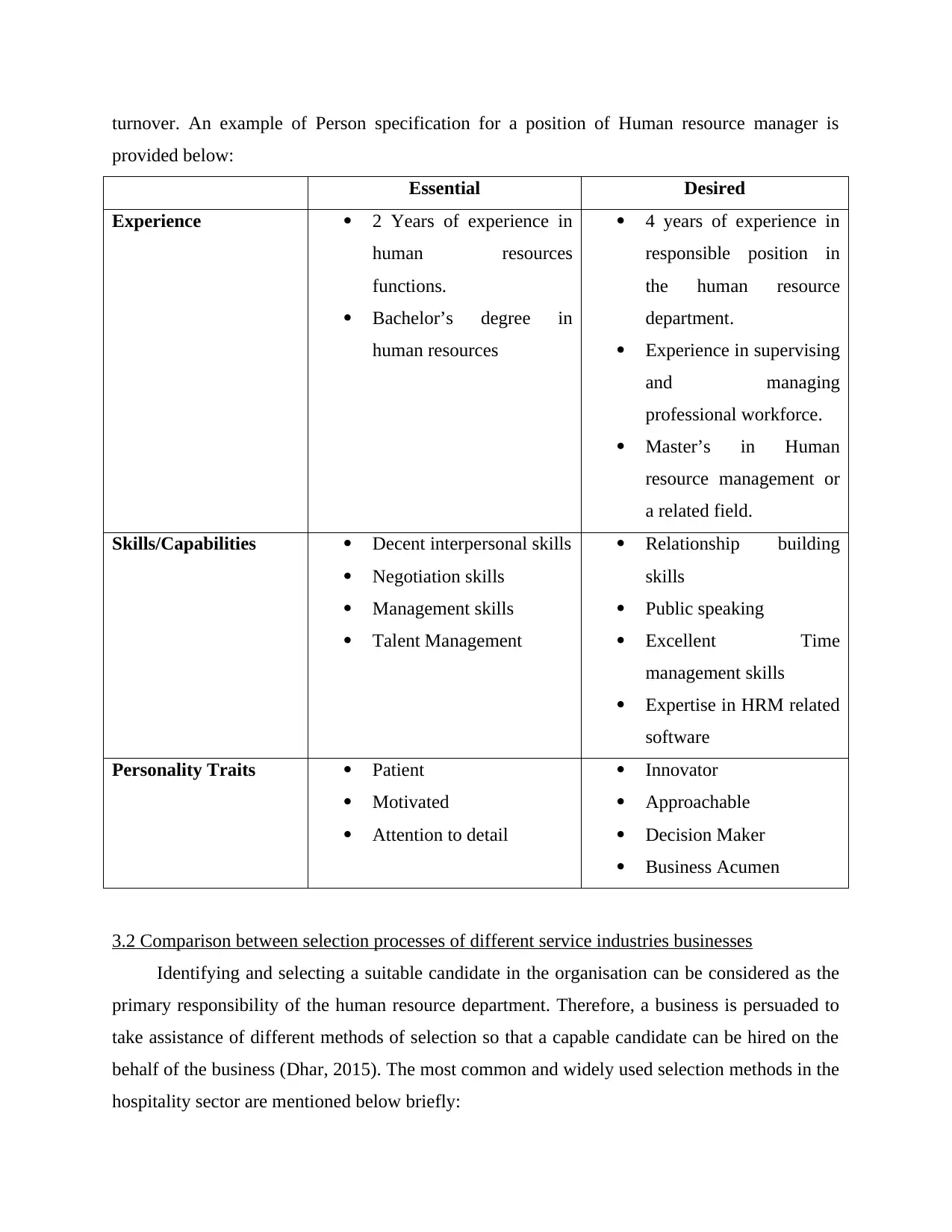
turnover. An example of Person specification for a position of Human resource manager is
provided below:
Essential Desired
Experience 2 Years of experience in
human resources
functions.
Bachelor’s degree in
human resources
4 years of experience in
responsible position in
the human resource
department.
Experience in supervising
and managing
professional workforce.
Master’s in Human
resource management or
a related field.
Skills/Capabilities Decent interpersonal skills
Negotiation skills
Management skills
Talent Management
Relationship building
skills
Public speaking
Excellent Time
management skills
Expertise in HRM related
software
Personality Traits Patient
Motivated
Attention to detail
Innovator
Approachable
Decision Maker
Business Acumen
3.2 Comparison between selection processes of different service industries businesses
Identifying and selecting a suitable candidate in the organisation can be considered as the
primary responsibility of the human resource department. Therefore, a business is persuaded to
take assistance of different methods of selection so that a capable candidate can be hired on the
behalf of the business (Dhar, 2015). The most common and widely used selection methods in the
hospitality sector are mentioned below briefly:
provided below:
Essential Desired
Experience 2 Years of experience in
human resources
functions.
Bachelor’s degree in
human resources
4 years of experience in
responsible position in
the human resource
department.
Experience in supervising
and managing
professional workforce.
Master’s in Human
resource management or
a related field.
Skills/Capabilities Decent interpersonal skills
Negotiation skills
Management skills
Talent Management
Relationship building
skills
Public speaking
Excellent Time
management skills
Expertise in HRM related
software
Personality Traits Patient
Motivated
Attention to detail
Innovator
Approachable
Decision Maker
Business Acumen
3.2 Comparison between selection processes of different service industries businesses
Identifying and selecting a suitable candidate in the organisation can be considered as the
primary responsibility of the human resource department. Therefore, a business is persuaded to
take assistance of different methods of selection so that a capable candidate can be hired on the
behalf of the business (Dhar, 2015). The most common and widely used selection methods in the
hospitality sector are mentioned below briefly:
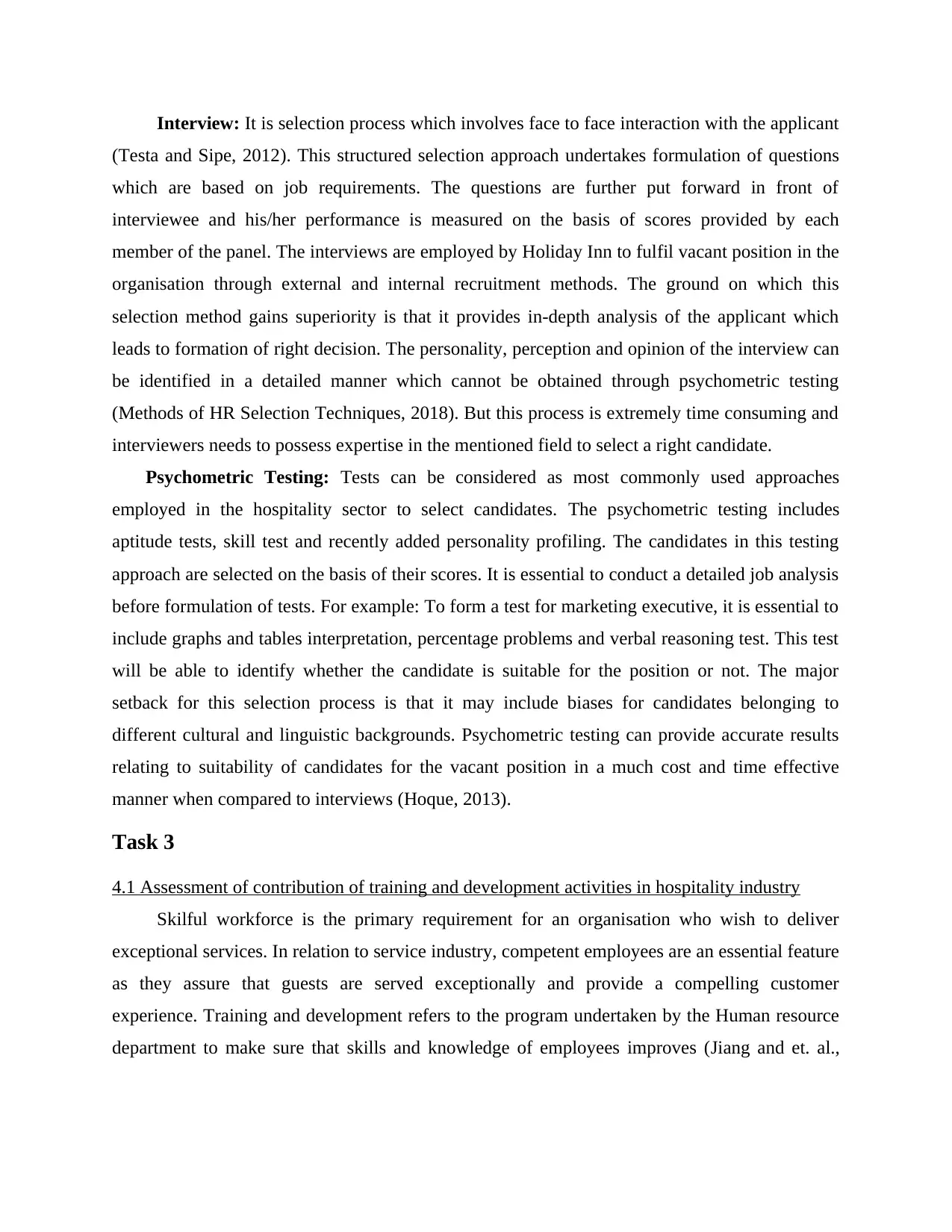
Interview: It is selection process which involves face to face interaction with the applicant
(Testa and Sipe, 2012). This structured selection approach undertakes formulation of questions
which are based on job requirements. The questions are further put forward in front of
interviewee and his/her performance is measured on the basis of scores provided by each
member of the panel. The interviews are employed by Holiday Inn to fulfil vacant position in the
organisation through external and internal recruitment methods. The ground on which this
selection method gains superiority is that it provides in-depth analysis of the applicant which
leads to formation of right decision. The personality, perception and opinion of the interview can
be identified in a detailed manner which cannot be obtained through psychometric testing
(Methods of HR Selection Techniques, 2018). But this process is extremely time consuming and
interviewers needs to possess expertise in the mentioned field to select a right candidate.
Psychometric Testing: Tests can be considered as most commonly used approaches
employed in the hospitality sector to select candidates. The psychometric testing includes
aptitude tests, skill test and recently added personality profiling. The candidates in this testing
approach are selected on the basis of their scores. It is essential to conduct a detailed job analysis
before formulation of tests. For example: To form a test for marketing executive, it is essential to
include graphs and tables interpretation, percentage problems and verbal reasoning test. This test
will be able to identify whether the candidate is suitable for the position or not. The major
setback for this selection process is that it may include biases for candidates belonging to
different cultural and linguistic backgrounds. Psychometric testing can provide accurate results
relating to suitability of candidates for the vacant position in a much cost and time effective
manner when compared to interviews (Hoque, 2013).
Task 3
4.1 Assessment of contribution of training and development activities in hospitality industry
Skilful workforce is the primary requirement for an organisation who wish to deliver
exceptional services. In relation to service industry, competent employees are an essential feature
as they assure that guests are served exceptionally and provide a compelling customer
experience. Training and development refers to the program undertaken by the Human resource
department to make sure that skills and knowledge of employees improves (Jiang and et. al.,
(Testa and Sipe, 2012). This structured selection approach undertakes formulation of questions
which are based on job requirements. The questions are further put forward in front of
interviewee and his/her performance is measured on the basis of scores provided by each
member of the panel. The interviews are employed by Holiday Inn to fulfil vacant position in the
organisation through external and internal recruitment methods. The ground on which this
selection method gains superiority is that it provides in-depth analysis of the applicant which
leads to formation of right decision. The personality, perception and opinion of the interview can
be identified in a detailed manner which cannot be obtained through psychometric testing
(Methods of HR Selection Techniques, 2018). But this process is extremely time consuming and
interviewers needs to possess expertise in the mentioned field to select a right candidate.
Psychometric Testing: Tests can be considered as most commonly used approaches
employed in the hospitality sector to select candidates. The psychometric testing includes
aptitude tests, skill test and recently added personality profiling. The candidates in this testing
approach are selected on the basis of their scores. It is essential to conduct a detailed job analysis
before formulation of tests. For example: To form a test for marketing executive, it is essential to
include graphs and tables interpretation, percentage problems and verbal reasoning test. This test
will be able to identify whether the candidate is suitable for the position or not. The major
setback for this selection process is that it may include biases for candidates belonging to
different cultural and linguistic backgrounds. Psychometric testing can provide accurate results
relating to suitability of candidates for the vacant position in a much cost and time effective
manner when compared to interviews (Hoque, 2013).
Task 3
4.1 Assessment of contribution of training and development activities in hospitality industry
Skilful workforce is the primary requirement for an organisation who wish to deliver
exceptional services. In relation to service industry, competent employees are an essential feature
as they assure that guests are served exceptionally and provide a compelling customer
experience. Training and development refers to the program undertaken by the Human resource
department to make sure that skills and knowledge of employees improves (Jiang and et. al.,
⊘ This is a preview!⊘
Do you want full access?
Subscribe today to unlock all pages.

Trusted by 1+ million students worldwide
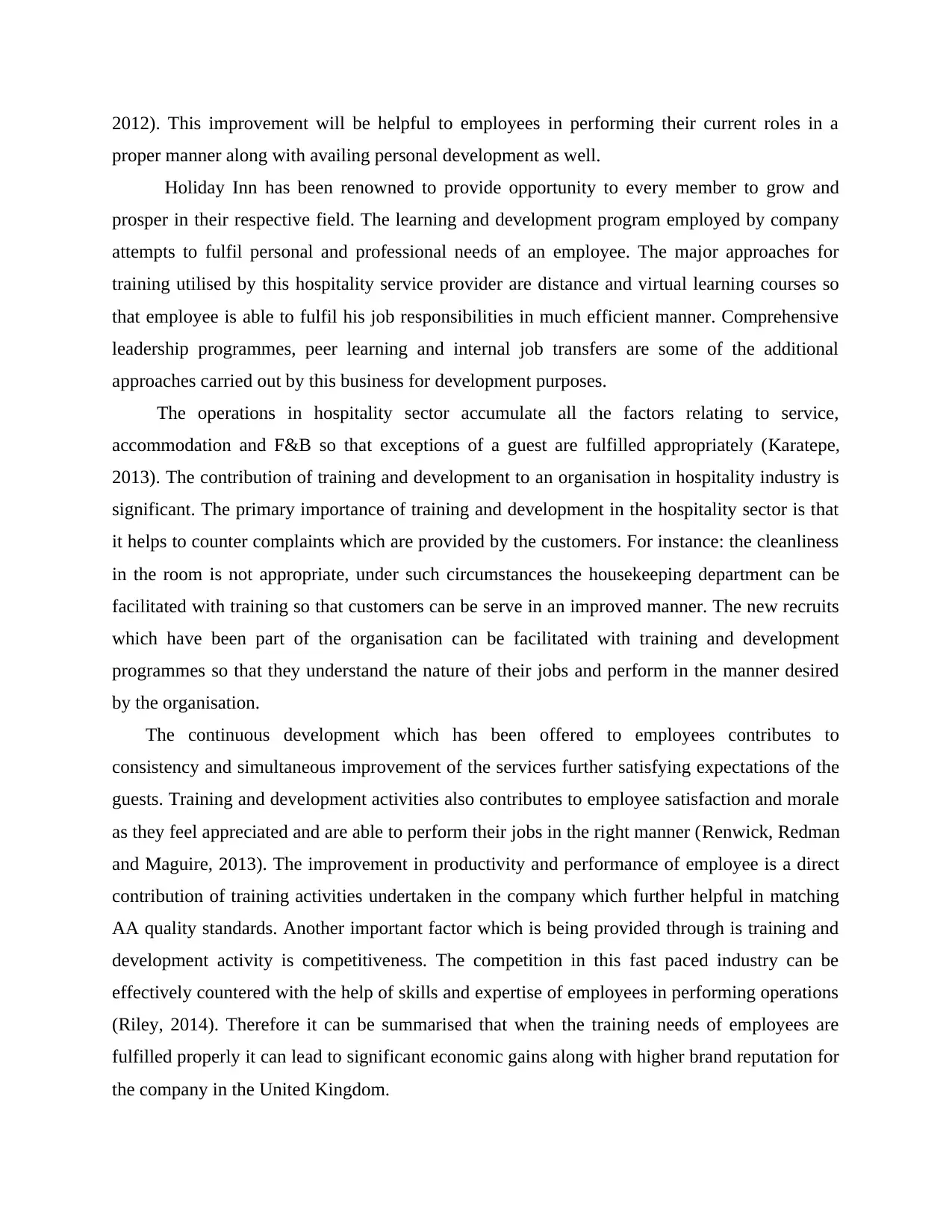
2012). This improvement will be helpful to employees in performing their current roles in a
proper manner along with availing personal development as well.
Holiday Inn has been renowned to provide opportunity to every member to grow and
prosper in their respective field. The learning and development program employed by company
attempts to fulfil personal and professional needs of an employee. The major approaches for
training utilised by this hospitality service provider are distance and virtual learning courses so
that employee is able to fulfil his job responsibilities in much efficient manner. Comprehensive
leadership programmes, peer learning and internal job transfers are some of the additional
approaches carried out by this business for development purposes.
The operations in hospitality sector accumulate all the factors relating to service,
accommodation and F&B so that exceptions of a guest are fulfilled appropriately (Karatepe,
2013). The contribution of training and development to an organisation in hospitality industry is
significant. The primary importance of training and development in the hospitality sector is that
it helps to counter complaints which are provided by the customers. For instance: the cleanliness
in the room is not appropriate, under such circumstances the housekeeping department can be
facilitated with training so that customers can be serve in an improved manner. The new recruits
which have been part of the organisation can be facilitated with training and development
programmes so that they understand the nature of their jobs and perform in the manner desired
by the organisation.
The continuous development which has been offered to employees contributes to
consistency and simultaneous improvement of the services further satisfying expectations of the
guests. Training and development activities also contributes to employee satisfaction and morale
as they feel appreciated and are able to perform their jobs in the right manner (Renwick, Redman
and Maguire, 2013). The improvement in productivity and performance of employee is a direct
contribution of training activities undertaken in the company which further helpful in matching
AA quality standards. Another important factor which is being provided through is training and
development activity is competitiveness. The competition in this fast paced industry can be
effectively countered with the help of skills and expertise of employees in performing operations
(Riley, 2014). Therefore it can be summarised that when the training needs of employees are
fulfilled properly it can lead to significant economic gains along with higher brand reputation for
the company in the United Kingdom.
proper manner along with availing personal development as well.
Holiday Inn has been renowned to provide opportunity to every member to grow and
prosper in their respective field. The learning and development program employed by company
attempts to fulfil personal and professional needs of an employee. The major approaches for
training utilised by this hospitality service provider are distance and virtual learning courses so
that employee is able to fulfil his job responsibilities in much efficient manner. Comprehensive
leadership programmes, peer learning and internal job transfers are some of the additional
approaches carried out by this business for development purposes.
The operations in hospitality sector accumulate all the factors relating to service,
accommodation and F&B so that exceptions of a guest are fulfilled appropriately (Karatepe,
2013). The contribution of training and development to an organisation in hospitality industry is
significant. The primary importance of training and development in the hospitality sector is that
it helps to counter complaints which are provided by the customers. For instance: the cleanliness
in the room is not appropriate, under such circumstances the housekeeping department can be
facilitated with training so that customers can be serve in an improved manner. The new recruits
which have been part of the organisation can be facilitated with training and development
programmes so that they understand the nature of their jobs and perform in the manner desired
by the organisation.
The continuous development which has been offered to employees contributes to
consistency and simultaneous improvement of the services further satisfying expectations of the
guests. Training and development activities also contributes to employee satisfaction and morale
as they feel appreciated and are able to perform their jobs in the right manner (Renwick, Redman
and Maguire, 2013). The improvement in productivity and performance of employee is a direct
contribution of training activities undertaken in the company which further helpful in matching
AA quality standards. Another important factor which is being provided through is training and
development activity is competitiveness. The competition in this fast paced industry can be
effectively countered with the help of skills and expertise of employees in performing operations
(Riley, 2014). Therefore it can be summarised that when the training needs of employees are
fulfilled properly it can lead to significant economic gains along with higher brand reputation for
the company in the United Kingdom.
Paraphrase This Document
Need a fresh take? Get an instant paraphrase of this document with our AI Paraphraser
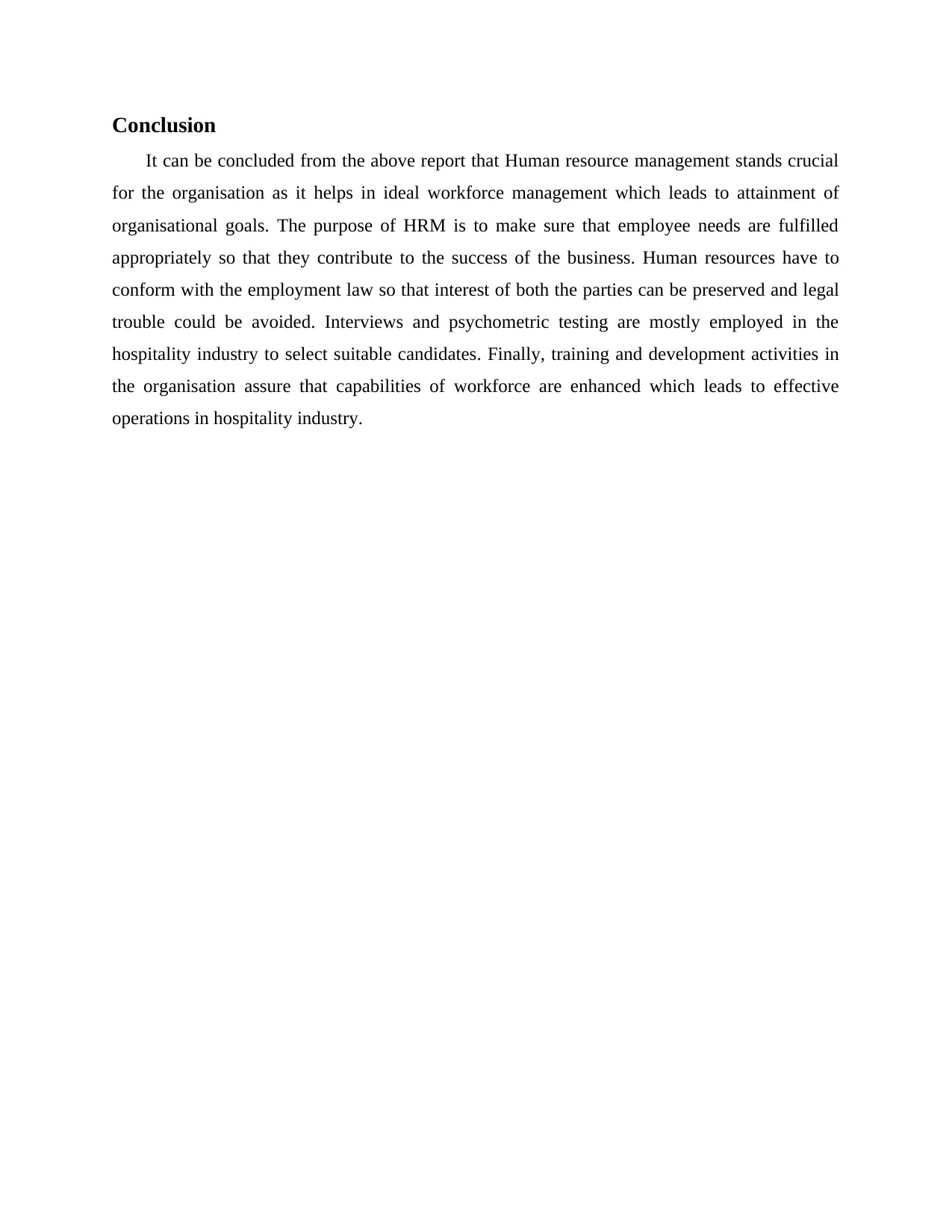
Conclusion
It can be concluded from the above report that Human resource management stands crucial
for the organisation as it helps in ideal workforce management which leads to attainment of
organisational goals. The purpose of HRM is to make sure that employee needs are fulfilled
appropriately so that they contribute to the success of the business. Human resources have to
conform with the employment law so that interest of both the parties can be preserved and legal
trouble could be avoided. Interviews and psychometric testing are mostly employed in the
hospitality industry to select suitable candidates. Finally, training and development activities in
the organisation assure that capabilities of workforce are enhanced which leads to effective
operations in hospitality industry.
It can be concluded from the above report that Human resource management stands crucial
for the organisation as it helps in ideal workforce management which leads to attainment of
organisational goals. The purpose of HRM is to make sure that employee needs are fulfilled
appropriately so that they contribute to the success of the business. Human resources have to
conform with the employment law so that interest of both the parties can be preserved and legal
trouble could be avoided. Interviews and psychometric testing are mostly employed in the
hospitality industry to select suitable candidates. Finally, training and development activities in
the organisation assure that capabilities of workforce are enhanced which leads to effective
operations in hospitality industry.
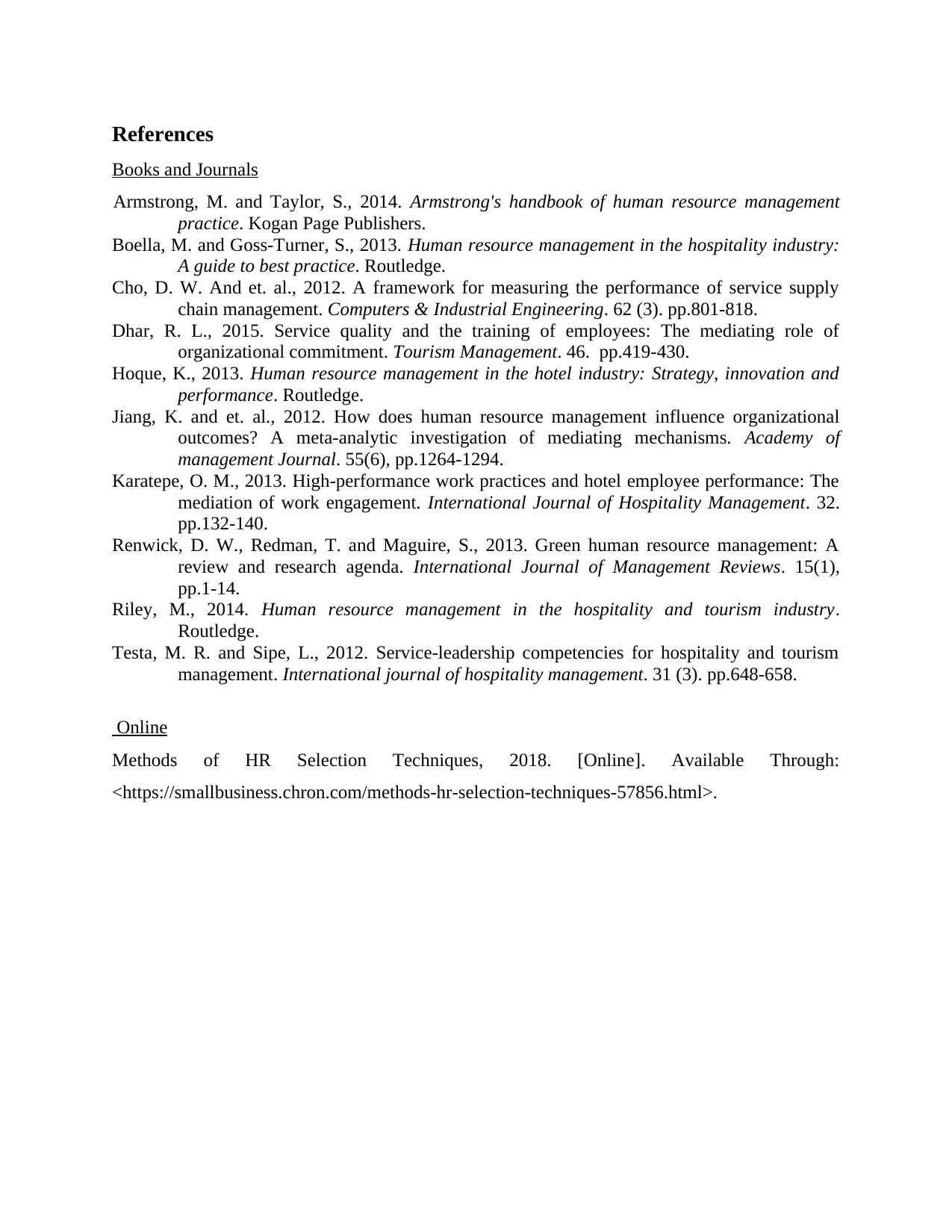
References
Books and Journals
Armstrong, M. and Taylor, S., 2014. Armstrong's handbook of human resource management
practice. Kogan Page Publishers.
Boella, M. and Goss-Turner, S., 2013. Human resource management in the hospitality industry:
A guide to best practice. Routledge.
Cho, D. W. And et. al., 2012. A framework for measuring the performance of service supply
chain management. Computers & Industrial Engineering. 62 (3). pp.801-818.
Dhar, R. L., 2015. Service quality and the training of employees: The mediating role of
organizational commitment. Tourism Management. 46. pp.419-430.
Hoque, K., 2013. Human resource management in the hotel industry: Strategy, innovation and
performance. Routledge.
Jiang, K. and et. al., 2012. How does human resource management influence organizational
outcomes? A meta-analytic investigation of mediating mechanisms. Academy of
management Journal. 55(6), pp.1264-1294.
Karatepe, O. M., 2013. High-performance work practices and hotel employee performance: The
mediation of work engagement. International Journal of Hospitality Management. 32.
pp.132-140.
Renwick, D. W., Redman, T. and Maguire, S., 2013. Green human resource management: A
review and research agenda. International Journal of Management Reviews. 15(1),
pp.1-14.
Riley, M., 2014. Human resource management in the hospitality and tourism industry.
Routledge.
Testa, M. R. and Sipe, L., 2012. Service-leadership competencies for hospitality and tourism
management. International journal of hospitality management. 31 (3). pp.648-658.
Online
Methods of HR Selection Techniques, 2018. [Online]. Available Through:
<https://smallbusiness.chron.com/methods-hr-selection-techniques-57856.html>.
Books and Journals
Armstrong, M. and Taylor, S., 2014. Armstrong's handbook of human resource management
practice. Kogan Page Publishers.
Boella, M. and Goss-Turner, S., 2013. Human resource management in the hospitality industry:
A guide to best practice. Routledge.
Cho, D. W. And et. al., 2012. A framework for measuring the performance of service supply
chain management. Computers & Industrial Engineering. 62 (3). pp.801-818.
Dhar, R. L., 2015. Service quality and the training of employees: The mediating role of
organizational commitment. Tourism Management. 46. pp.419-430.
Hoque, K., 2013. Human resource management in the hotel industry: Strategy, innovation and
performance. Routledge.
Jiang, K. and et. al., 2012. How does human resource management influence organizational
outcomes? A meta-analytic investigation of mediating mechanisms. Academy of
management Journal. 55(6), pp.1264-1294.
Karatepe, O. M., 2013. High-performance work practices and hotel employee performance: The
mediation of work engagement. International Journal of Hospitality Management. 32.
pp.132-140.
Renwick, D. W., Redman, T. and Maguire, S., 2013. Green human resource management: A
review and research agenda. International Journal of Management Reviews. 15(1),
pp.1-14.
Riley, M., 2014. Human resource management in the hospitality and tourism industry.
Routledge.
Testa, M. R. and Sipe, L., 2012. Service-leadership competencies for hospitality and tourism
management. International journal of hospitality management. 31 (3). pp.648-658.
Online
Methods of HR Selection Techniques, 2018. [Online]. Available Through:
<https://smallbusiness.chron.com/methods-hr-selection-techniques-57856.html>.
⊘ This is a preview!⊘
Do you want full access?
Subscribe today to unlock all pages.

Trusted by 1+ million students worldwide

Paraphrase This Document
Need a fresh take? Get an instant paraphrase of this document with our AI Paraphraser

1
1 out of 11
Related Documents
Your All-in-One AI-Powered Toolkit for Academic Success.
+13062052269
info@desklib.com
Available 24*7 on WhatsApp / Email
![[object Object]](/_next/static/media/star-bottom.7253800d.svg)
Unlock your academic potential
Copyright © 2020–2026 A2Z Services. All Rights Reserved. Developed and managed by ZUCOL.





